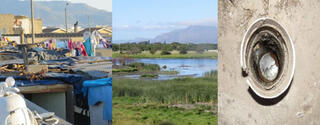Seminar Series:

The latest IPCCC report shows that average temperatures on land have already risen by 1.5 ℃. The climatic impacts of this are being experienced across the globe in the form of more frequent extreme weather events and more prolonged periods of climate-induced stress. More and more regions are experiencing droughts, fire weather/fires and water scarcity; or/and heavy rains, storms and flooding.
These changes have complex and at times hard-to-predict human and social consequences; but what is perhaps most predictable is that it is the already precarious who suffer them soonest and hardest. Impacts are already being felt by the millions of people living in informal and marginalized urban settlements, in the form of run-away fires, water scarcity and floods. These settlements, often comprising temporary dwellings and located on the fringes of the world’s major cities, within sight of the infrastructure and services they lack, may be particularly physically vulnerable to such climate-related shocks and stresses. However, they are also sites of immense strength and ingenuity. There is much to be learned from them, both about how residents cope and adapt and how we might envisage changes in the future. There is also much to be learned about how complex assemblages of environmental, political, physical and social actors create the conditions for reproduction or change.
Our workshop – to be held in Glasgow, the city that hosted COP 26 just under a year ago – will bring together researchers, practitioners and other stakeholders working in different global regions and different disciplines, but who have a common interest in addressing the confluence of urban precarity and the climate crisis. The workshop will include active discussion sessions and a closing panel discussion.
- Log in to post comments














Latest Comments